Description
Aceh (pronounced AH-CHEY) is the northernmost province of Sumatra. Its highland territory, surrounding Lake Tawar and the central city of Takengon, is considered to be the epicenter of one of the world’s most unique coffee terroirs. Coffee farms in this area are managed with the experience of many generations of cultivation, while also harmoniously woven into their surrounding tropical forests. The canopies are loud and fields are almost impenetrably thick with coffee plants, fruit trees, and vegetables, all of which are constantly flushing with new growth. Year-round mists and rain showers never cease, farm floors are spongy and deep with layered biomass, and almost every square meter of the region seems to exude life. Nothing is ever still. Including coffee ripening, which occurs ten months out of the year.
Farmers in this group are organized around the Gayo Lauser Antara cooperative (shortened to KPGLA), which was first established in 2013. KPGLA is located, along with its grower members, in the Jagong Jeget district, on the western end of the Aceh Tengah regency, one of Aceh’s most prolific coffee producing areas. Collectively the cooperative’s members control 770 hectares of farmland.
Tasting Notes:
A very nice fresh crop arrival. Full bodied with a creamy mouthfeel, low acidity and spot on tastes from a traditional Mandheling Sumatra; peat moss, smoky, chocolaty, fuller bodied and strong. A clean enough cup to get a decent medium roast, gives a smoother mouthfeel and has a bit of sweetness upfront, darker roasts will turn thicker but also edgier and promote the smokier semi-sweet side of the profile.
Roasting Notes:
As with most Sumatra coffees, the processing promotes a couple different shades in the roaster. It is normal to see some beans lighter than others. Make sure if shooting for the medium roasts, that you judge it from the lighter looking beans, important to get them all through first crack. When roasting darker, judge it by the darker looking beans for if they get too dark or burn, gets a little ashy tone in the cup.
Sumatra’s smallholder coffee is a complicated process. Notably, processing is typically not overseen by a single individual or team; instead, coffee moves task by task through different parties before reaching its final, fully-dried, state. Coffee farms in Aceh Tengah average 0.5-2 hectares each. Every village with cooperative members has a collector (or more) who receives fresh-picked cherry for washed processing each day. Once a batch of coffee has been depulped, fermented overnight, washed clean, and then sun-dried to the touch, each collector then delivers the batch to the cooperative’s central mill. It is at the mill where the coffee is mechanically hulled of its parchment, leaving behind just the soft, high-moisture coffee bean (thus earning the term “wet-hulled”), all of which is spread out on large patios to continue drying. Each handoff is orchestrated by the cooperative, and the members’ coffee is traced throughout each step of the chain.
KPGLA, along with many local industries in the region, identifies itself as “Gayo”, after the Gayonese ethnic group which has long made Aceh their home, and which comprises a vast majority of farmer members. Regional coffee distinctions in the northern provinces of Sumatra are interestingly all based on human ethnicity, rather than geography itself, which unfortunately has muddled the island’s traceability over time. “Mandheling” for example, is a broad label for a widespread cultural group in Sumatra and Malaysia and subsequently the broadest coffee trading term, applying to almost any chosen blend of wet-hulled coffees from across the northern half of the island. These terms are malleable, and it is often difficult to pinpoint a coffee’s exact origin without direct partnerships that allow buyers to trace the entire value chain themselves. So, it is helpful to work with exporters with a local supply chain, who themselves operate in the highlands and are personally invested in their community’s success. KPGLA regularly distributes farming tools and cash dividends to cooperative members, as well as school supplies for families with schoolchildren.
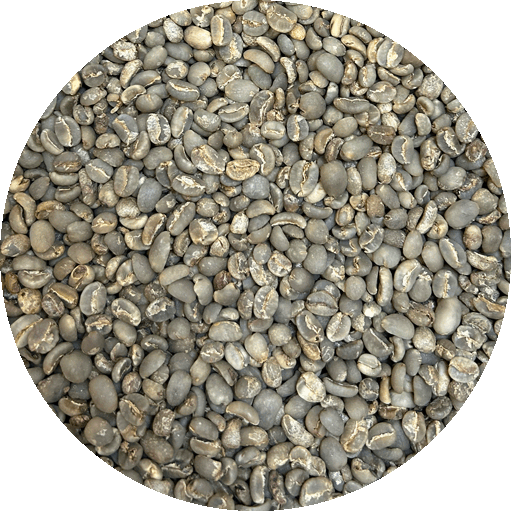
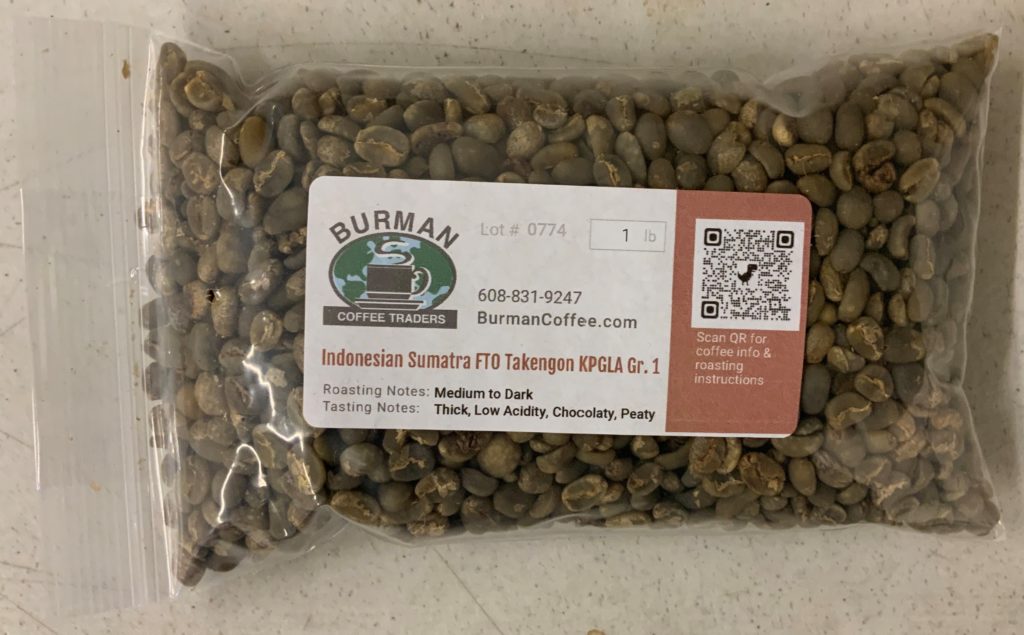
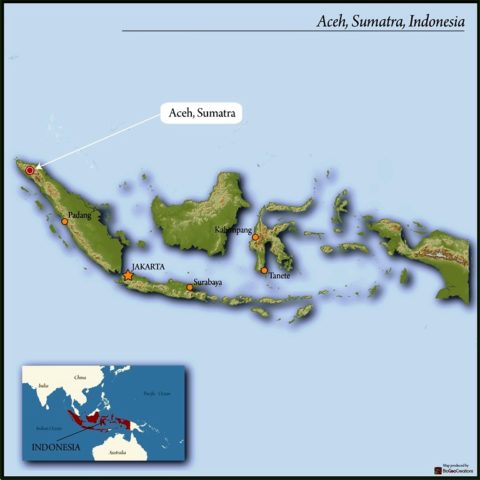
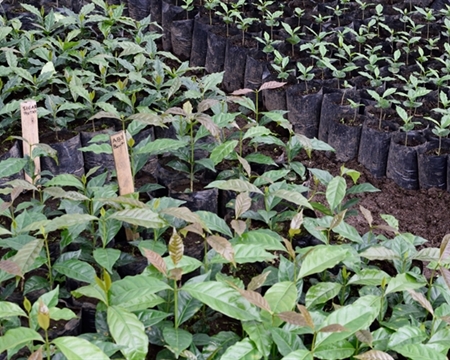
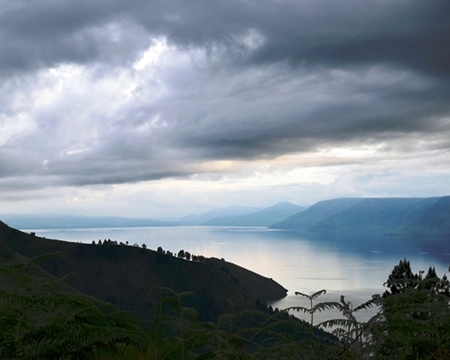
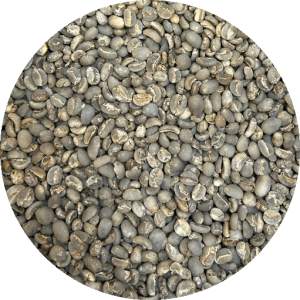
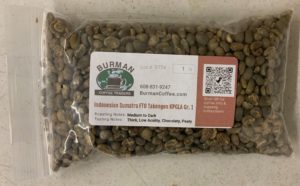
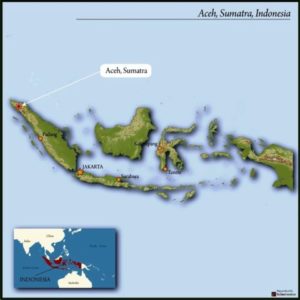
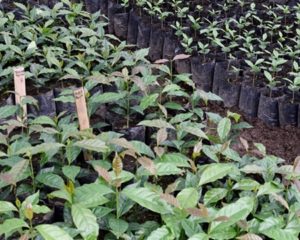
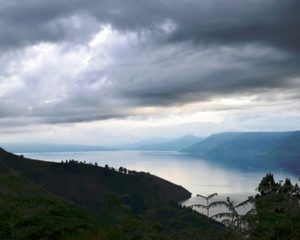
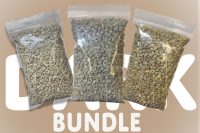
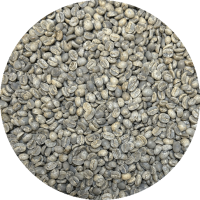
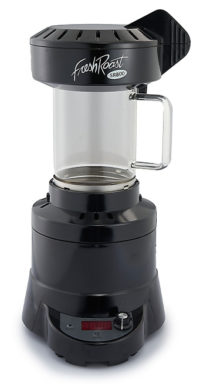
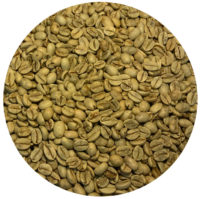

UrDad (verified owner) –
This is excellent. I roast dark, and I get that cocoa and black tea flavor from this. You won’t regret buying this.
mail.matt.morgan (verified owner) –
The green coffee has some damaged beans, to be sure– broken, insect damaged, and some otherwise badly discolored. Probably about 5% of the total weight, based on having roasted a few small batches. Roasted product has some quakers too.
I’d recommend sorting both before and after roasting, but the final product is very good if you do.
Rebekah Spidell (verified owner) –
Im not the biggest fan of pacific beans by themselves, but I get them to mix into blends. I roasted this to a French roast and just tried some to get a flavour profile. Wow, this stuff is smooth. There is a delicious smokiness that blends with the chocolate and the chocolate itself adds a sweetness that tempers the bite you tend to get from dark roasted pacific plends without diminishing the boldness and body of the coffee.
Tom Clark (verified owner) –
Delicious at Full City+